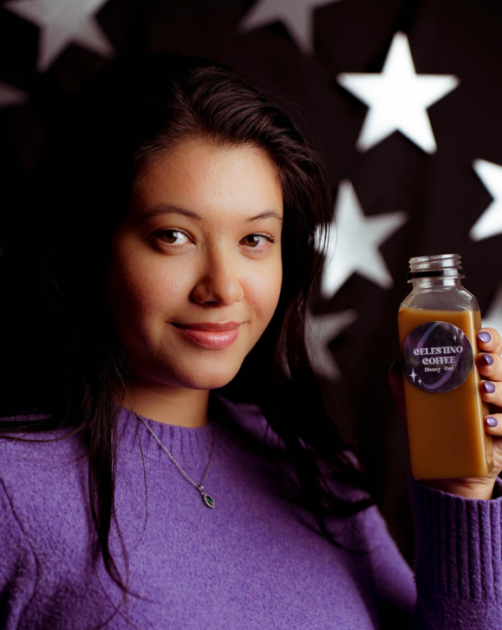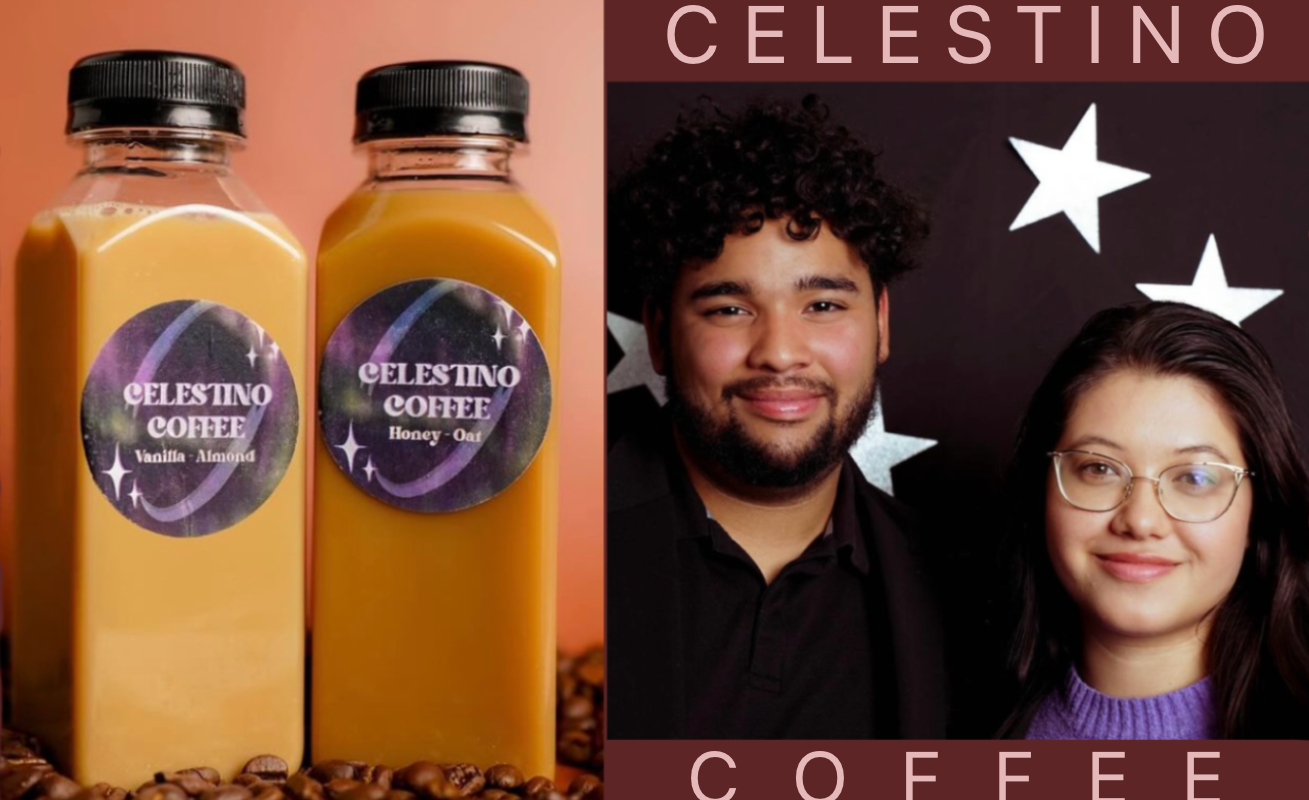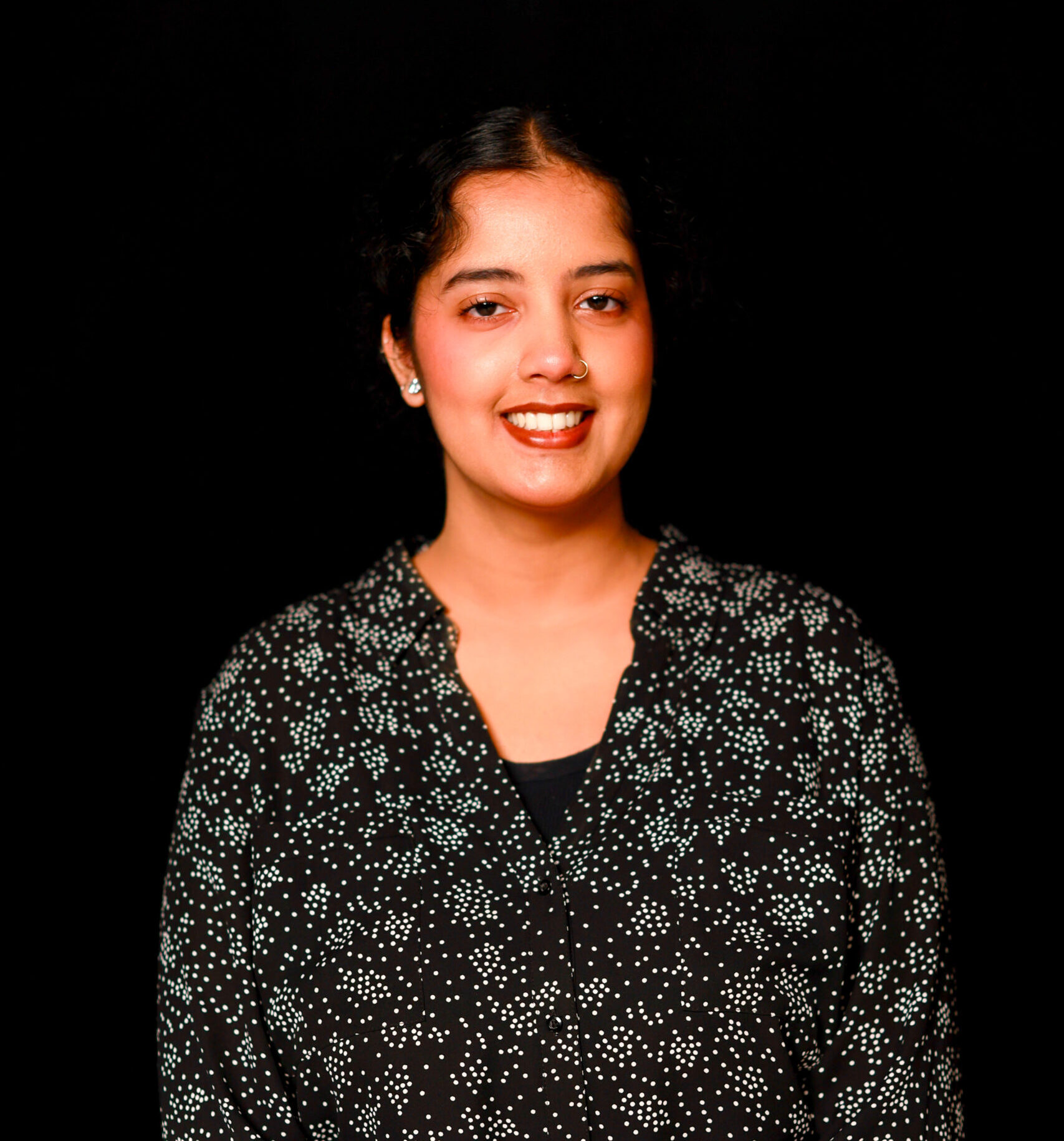Coffee is an integral part of the college experience for students across the country.
From pulling all-nighters or staying awake until the early hours of the morning, students who buy coffee daily will spend an average of $63 a month on coffee, according to the Education Data Initiative.
Giovanni Almonte, a senior marketing major at the university, and Lindsey Byrd, a senior at the Ohio State University, know all about how costly coffee can be. This is why in their business, Celestino Coffee, Almonte and Byrd rely on affordability as part of their three core principles, alongside healthiness and accessibility.

“I’m a college student, and I don’t have money at all, so [we’re] trying to keep it [the cost] at a point where we know people can afford it, and it’s something good that they’ll enjoy,” said Almonte. He said Celestino being affordable has helped the business build recurring customers of about “20-30%.”
Almonte and Byrd also pride themselves on how healthy and accessible their coffees are, compared to other coffee brands.
“The thing with a lot of drinks in general, especially energy drinks and coffee drinks, is that they’re loaded with sugar,” Almonte said. “Cow milk makes you feel heavier and worse in the sun.”
Byrd said a lot of the coffee bought in stores is made up with “cow milk, whole milk, any dairy products,” making brands lose the audience that cannot consume dairy.
“Milk sometimes upsets my stomach, [but] I love an iced coffee,” said Byrd. “[Celestino is] providing options for people like us who also want to enjoy an iced latte.”
Celestino’s coffee contains premium plant-based milk and uses less sugar than its competitors. There are less calories too, making it easier for consumers to balance their diet and still appreciate the taste of coffee.
According to a CBS News article, drinks from Starbucks, McDonald’s and Dunkin’ Donuts all have over 200 calories in each of their mocha lattes. Celestino’s “Vanilla-Almond” flavor has 110 calories, which is significantly less than these competitors.
While using plant-based milks as a main selling point for their brand, Almonte and Byrd also value the taste of their coffee; they want people to enjoy it.
Almonte, who is a Dominican-American, said he grew up in New York drinking a lot of Hispanic coffee that enriched his taste and helped him figure out what type of coffee will taste good to everybody.
“When I came to Ohio and I went to a coffee shop, and it didn’t taste the same, I just [thought all] coffee tastes bad unless they have a lot of sugar in them,” said Almonte.
When he went back to New York, Almonte realized that when his mother made coffee, she never added sugar to it to better the taste. The extra sugar in Ohio’s coffee was the problem all along.
Since then, Almonte and Byrd have decided to use Colombian brewed coffee in their beverages because it “leaves you with a nice coffee taste,” and uses “a lot less sugar.”
Currently, Celestino offers three different flavors: “Vanilla-Almond,” “Honey-Oat” and their limited edition for the fall season, “Pumpkin Spice.”
Byrd said they are working on new limited edition seasonal flavors, regular menu items and other drinks inspired by Byrd’s and Almonte’s cultural backgrounds.
“We’re hoping to come out with some more unique flavors that are inspired by … our… background, like Vietnamese iced coffee, [since] I’m Vietnamese and Cambodian,” Byrd said. “[We could also do] something influenced by Thai tea. I was also looking at some things that were more Dominican inspired.”
Some regular items to look out for include, but are not limited to, “mocha and caramel flavors.” The owners are looking to expand their milk options to soy and coconut milk as well.
“We’re still experimenting with the market,” said Byrd. “So we’re gonna have to see what we decide to add to the permanent roster.”
Despite having a success rate of selling a rough estimate of “$150 in revenue” per day, the pair finds it difficult to balance a healthy student-entrepreneur lifestyle. They said they made many sacrifices ranging from spending money and losing time to hang out with friends.
“I have zero of everything right now. If it wasn’t for the dorm [at the university], I would probably be homeless… [or] live in my car, or with her [Byrd], or with my friends,” said Almonte.
“I took on a new job that has a lot less hours and a lot lower pay in order to make more time to provide myself to this business,” said Byrd. “We had to stop going out as much [and] doing a lot of the fun college things.”
Their undying passion for the business, however, keeps the two pushing forward.
“We both have strong passions for this business, and [we] want to see it succeed,” Byrd said. “So there are sacrifices we’re willing to make.”
Almonte and Byrd encourage other young entrepreneurs to go through with their “crazy” business ideas because “it might not be as crazy as you feel like it is.”
“You have to be comfortable with not being comfortable,” said Almonte. “It’s a lot of money; it’s a lot of time… it feels like you’re not doing anything when you’re doing a lot. [There’s] a lot of mental struggle you’re going to deal with, but my biggest thing is to just do it.”
“I came up with it [Celestino Coffee] at first in a business class, and it really just goes to show anything that pops up in your head, you can make a reality,” said Byrd.
To place an order, students can visit their website and follow their Instagram for updates.


